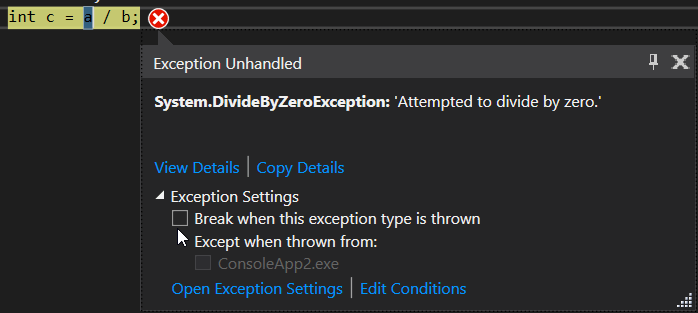In this article, Let us see what is ELMAH..
WHAT IS ELMAH?
ELMAH stands for Error Logging Modules And Handlers that provide functionality to logging run time ASP.NET errors.- Enables logging of all unhandled exceptions.
- logs all errors in many storages, like - SQL Server, MySQL, Random Access Memory (RAM), SQL Lite, and Oracle.
- It has functionality to download all errors in CSV file.
- RSS feed for the last 15 errors
- Get all error data in JSON or XML format
- Get all errors to our mailbox
- Send error log notification to your application
- Customize the error log by customizing some code.
Implementing into MVC Application
1. Install ELMAH using Nuget package manager into your application.
2. Configure your web.config with ELMAH attributes like below:
<?xml version="1.0" encoding="utf-8"?>
<!--
For more information on how to configure your ASP.NET application, please visit
http://go.microsoft.com/fwlink/?LinkId=301880
-->
<configuration>
<configSections>
<!-- For more information on Entity Framework configuration, visit http://go.microsoft.com/fwlink/?LinkID=237468 -->
<section name="entityFramework" type="System.Data.Entity.Internal.ConfigFile.EntityFrameworkSection, EntityFramework, Version=6.0.0.0, Culture=neutral, PublicKeyToken=b77a5c561934e089" requirePermission="false" />
<sectionGroup name="elmah">
<section name="security" requirePermission="false" type="Elmah.SecuritySectionHandler, Elmah" />
<section name="errorLog" requirePermission="false" type="Elmah.ErrorLogSectionHandler, Elmah" />
<section name="errorMail" requirePermission="false" type="Elmah.ErrorMailSectionHandler, Elmah" />
<section name="errorFilter" requirePermission="false" type="Elmah.ErrorFilterSectionHandler, Elmah" />
</sectionGroup>
</configSections>
<connectionStrings>
<add name="DefaultConnection" connectionString="Data Source=.;Initial Catalog=ExceptionLog;Integrated Security=True" providerName="System.Data.SqlClient" />
</connectionStrings>
<appSettings>
<add key="webpages:Version" value="3.0.0.0" />
<add key="webpages:Enabled" value="false" />
<add key="ClientValidationEnabled" value="true" />
<add key="UnobtrusiveJavaScriptEnabled" value="true" />
<add key="elmah.mvc.disableHandler" value="false" />
<add key="elmah.mvc.disableHandleErrorFilter" value="false" />
<add key="elmah.mvc.requiresAuthentication" value="false" />
<add key="elmah.mvc.IgnoreDefaultRoute" value="false" />
<add key="elmah.mvc.allowedRoles" value="*" />
<add key="elmah.mvc.allowedUsers" value="*" />
<add key="elmah.mvc.route" value="elmah" />
<add key="elmah.mvc.UserAuthCaseSensitive" value="true" />
</appSettings>
<system.web>
<authentication mode="None" />
<compilation debug="true" targetFramework="4.5.1" />
<httpRuntime targetFramework="4.5.1" />
<!--add this-->
<httpHandlers>
<add verb="POST,GET,HEAD" path="elmah.axd" type="Elmah.ErrorLogPageFactory, Elmah" />
</httpHandlers>
<!--add this-->
<httpModules>
<add name="ErrorLog" type="Elmah.ErrorLogModule, Elmah" />
<add name="ErrorMail" type="Elmah.ErrorMailModule, Elmah" />
<add name="ErrorFilter" type="Elmah.ErrorFilterModule, Elmah" />
</httpModules>
</system.web>
<system.webServer>
<!--add this-->
<handlers>
<add name="Elmah" verb="POST,GET,HEAD" path="elmah.axd" type="Elmah.ErrorLogPageFactory, Elmah" />
</handlers>
<!--add this-->
<modules>
<remove name="FormsAuthentication" />
<add name="ErrorLog" type="Elmah.ErrorLogModule, Elmah" preCondition="managedHandler" />
<add name="ErrorMail" type="Elmah.ErrorMailModule, Elmah" preCondition="managedHandler" />
<add name="ErrorFilter" type="Elmah.ErrorFilterModule, Elmah" preCondition="managedHandler" />
</modules>
<validation validateIntegratedModeConfiguration="false" />
</system.webServer>
<runtime>
<assemblyBinding xmlns="urn:schemas-microsoft-com:asm.v1">
<dependentAssembly>
<assemblyIdentity name="Microsoft.Owin" publicKeyToken="31bf3856ad364e35" />
<bindingRedirect oldVersion="0.0.0.0-3.0.0.0" newVersion="3.0.0.0" />
</dependentAssembly>
<dependentAssembly>
<assemblyIdentity name="Microsoft.Owin.Security.OAuth" publicKeyToken="31bf3856ad364e35" />
<bindingRedirect oldVersion="0.0.0.0-3.0.0.0" newVersion="3.0.0.0" />
</dependentAssembly>
<dependentAssembly>
<assemblyIdentity name="Microsoft.Owin.Security.Cookies" publicKeyToken="31bf3856ad364e35" />
<bindingRedirect oldVersion="0.0.0.0-3.0.0.0" newVersion="3.0.0.0" />
</dependentAssembly>
<dependentAssembly>
<assemblyIdentity name="Microsoft.Owin.Security" publicKeyToken="31bf3856ad364e35" />
<bindingRedirect oldVersion="0.0.0.0-3.0.0.0" newVersion="3.0.0.0" />
</dependentAssembly>
<dependentAssembly>
<assemblyIdentity name="Newtonsoft.Json" culture="neutral" publicKeyToken="30ad4fe6b2a6aeed" />
<bindingRedirect oldVersion="0.0.0.0-6.0.0.0" newVersion="6.0.0.0" />
</dependentAssembly>
<dependentAssembly>
<assemblyIdentity name="System.Web.Helpers" publicKeyToken="31bf3856ad364e35" />
<bindingRedirect oldVersion="1.0.0.0-3.0.0.0" newVersion="3.0.0.0" />
</dependentAssembly>
<dependentAssembly>
<assemblyIdentity name="System.Web.Mvc" publicKeyToken="31bf3856ad364e35" />
<bindingRedirect oldVersion="0.0.0.0-5.2.2.0" newVersion="5.2.2.0" />
</dependentAssembly>
<dependentAssembly>
<assemblyIdentity name="System.Web.Optimization" publicKeyToken="31bf3856ad364e35" />
<bindingRedirect oldVersion="1.0.0.0-1.1.0.0" newVersion="1.1.0.0" />
</dependentAssembly>
<dependentAssembly>
<assemblyIdentity name="System.Web.WebPages" publicKeyToken="31bf3856ad364e35" />
<bindingRedirect oldVersion="1.0.0.0-3.0.0.0" newVersion="3.0.0.0" />
</dependentAssembly>
<dependentAssembly>
<assemblyIdentity name="WebGrease" publicKeyToken="31bf3856ad364e35" />
<bindingRedirect oldVersion="0.0.0.0-1.5.2.14234" newVersion="1.5.2.14234" />
</dependentAssembly>
</assemblyBinding>
</runtime>
<entityFramework>
<defaultConnectionFactory type="System.Data.Entity.Infrastructure.LocalDbConnectionFactory, EntityFramework">
<parameters>
<parameter value="mssqllocaldb" />
</parameters>
</defaultConnectionFactory>
<providers>
<provider invariantName="System.Data.SqlClient" type="System.Data.Entity.SqlServer.SqlProviderServices, EntityFramework.SqlServer" />
</providers>
</entityFramework>
<elmah>
<!--add this-->
<!--. If allowRemoteAccess value is set to 0, then the error log web page can only be viewed locally. If this attribute is set to 1 then the error log web page is enabled for both remote and local visitors.-->
<security allowRemoteAccess="0" />
<errorLog type="Elmah.SqlErrorLog, Elmah" connectionStringName="DefaultConnection" />
<!--add this-->
</elmah>
</configuration>
3. Now, Let us create a table to log the errors :
CREATE TABLE[dbo].[ELMAH_Error]
(
[ErrorId][uniqueidentifier] NOT NULL,
[Application][nvarchar](60) NOT NULL,
[Host][nvarchar](50) NOT NULL,
[Type][nvarchar](100) NOT NULL,
[Source][nvarchar](60) NOT NULL,
[Message][nvarchar](500) NOT NULL,
[User][nvarchar](50) NOT NULL,
[StatusCode][int] NOT NULL,
[TimeUtc][datetime] NOT NULL,
[Sequence][int] IDENTITY(1, 1) NOT NULL,
[AllXml][ntext] NOT NULL
)
Create below Stored Procedures :
Create PROCEDURE[dbo].[ELMAH_GetErrorsXml]
(
@Application NVARCHAR(60),
@PageIndex INT = 0,
@PageSize INT = 15,
@TotalCount INT OUTPUT
)
AS
SET NOCOUNT ON
DECLARE @FirstTimeUTC DATETIME
DECLARE @FirstSequence INT
DECLARE @StartRow INT
DECLARE @StartRowIndex INT
SELECT
@TotalCount = COUNT(1)
FROM
[ELMAH_Error]
WHERE
[Application] = @Application
SET @StartRowIndex = @PageIndex * @PageSize + 1
IF @StartRowIndex <= @TotalCount
BEGIN
SET ROWCOUNT @StartRowIndex
SELECT
@FirstTimeUTC = [TimeUtc],
@FirstSequence = [Sequence]
FROM
[ELMAH_Error]
WHERE
[Application] = @Application
ORDER BY
[TimeUtc] DESC,
[Sequence] DESC
END
ELSE
BEGIN
SET @PageSize = 0
END
SET ROWCOUNT @PageSize
SELECT
errorId = [ErrorId],
application = [Application],
host = [Host],
type = [Type],
source = [Source],
message = [Message],
[user] = [User],
statusCode = [StatusCode],
time = CONVERT(VARCHAR(50), [TimeUtc], 126) + 'Z'
FROM
[ELMAH_Error] error
WHERE
[Application] = @Application
AND
[TimeUtc] <= @FirstTimeUTC
AND
[Sequence] <= @FirstSequence
ORDER BY
[TimeUtc] DESC,
[Sequence] DESC
FOR
XML AUTO
Create PROCEDURE[dbo].[ELMAH_GetErrorXml]
(
@Application NVARCHAR(60),
@ErrorId UNIQUEIDENTIFIER
)
AS
SET NOCOUNT ON
SELECT
[AllXml]
FROM
[ELMAH_Error]
WHERE
[ErrorId] = @ErrorId
AND
[Application] = @Application
Create PROCEDURE[dbo].[ELMAH_LogError]
(
@ErrorId UNIQUEIDENTIFIER,
@Application NVARCHAR(60),
@Host NVARCHAR(30),
@Type NVARCHAR(100),
@Source NVARCHAR(60),
@Message NVARCHAR(500),
@User NVARCHAR(50),
@AllXml NTEXT,
@StatusCode INT,
@TimeUtc DATETIME
)
AS
SET NOCOUNT ON
INSERT
INTO
[ELMAH_Error]
(
[ErrorId],
[Application],
[Host],
[Type],
[Source],
[Message],
[User],
[AllXml],
[StatusCode],
[TimeUtc]
)
VALUES
(
@ErrorId,
@Application,
@Host,
@Type,
@Source,
@Message,
@User,
@AllXml,
@StatusCode,
@TimeUtc
)
That's it, Now your application is ready to track run time errors or exception by your site.
www.<sitename>.com/elmah.axd


